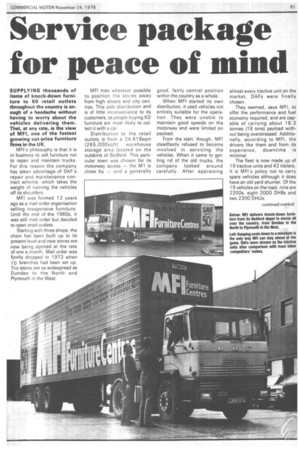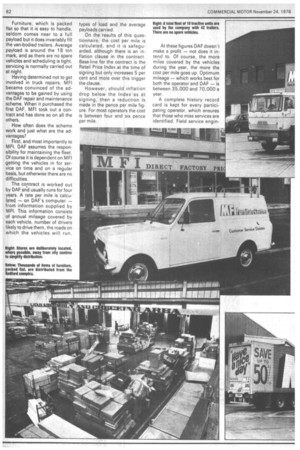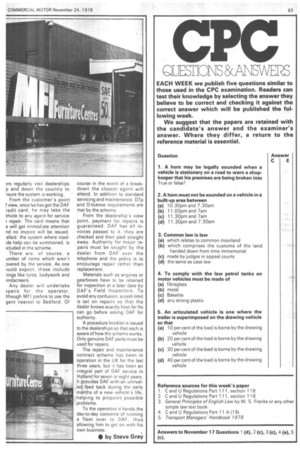Service package for peace of mind
Page 63

Page 64

Page 65

If you've noticed an error in this article please click here to report it so we can fix it.
SUPPLYING thousands of items of knock-down furniture to 60 retail outlets throughout the country is enough of a headache without having to worry about the vehicles delivering them. That, at any rate, is the view of MFI, one of the fastest growing cut-price furniture firms in the UK.
MFI's philosophy is that it is in business to sell furniture not to repair and maintain trucks. For this reason the company has taken advantage, of DAF's repair and maintenance contract scheme, which takes the weight of running the vehicles off its shoulders.
MFI was formed 12 years ago as a mail order organisation selling inexpensive furniture. Until the end of the 1960s, it was still mail order but decided to open retail outlets.
Starting with three shops, the chain ha been built up to its present level and new stores are now being opened at the rate of one a month. Mail order was fipally dropped in 1973 when 10 branches had been set up. Inc stores are as widespread as Dundee to the North and Plymouth in the West.
MP tries wherever possible to position the stores away. from high streets and city centres. This aids distribution and is of little inconvenience to its customers, as people buying KD furniture are most likely to collect it with a car.
Distribution to the retail outlets is' from a 24,618sqm (265,000sqft) warehouse storage area located on the outskirts of Bedford. This particular town was chosen for its motorway access — the M1 is close by — and a generally good, fairly central position within the country as a whole.
When MFI started its own distribution, it used vehicles not entirely suitable for the operation. They were unable to maintain good speeds on the motorway and were limited on payload.
From the start, though. MFI steadfastly refused to become involved in servicing the vehicles. When it came to getting rid of the old trucks, the company looked around carefully. After appraising almost every tractive unit on the market, DAFs were finally chosen.
They seemed, says MFI, to offer the performance and fuel economy required, and are capable of carrying about 18.3 tonnes (18 tons) payload without being overstressed. Additionally, according to MFI, the drivers like them and from its experience, downtime is minimal.
The fleet is now made up of 19 tractive units and 42 trailers. It is MFI's policy not to carry spare vehicles although it does have an old yard shunter. Of the 19 vehicles on the road, nine are 2200s, eight 2000 DI-18s and two 2300 DHUs. Furniture, which is packed flat so that it is easy to handle, seldom comes near to a full payload but it does invariably fill the van-bodied trailers. Average payload is around the 18 ton mark, and as there are no spare vehicles and scheduling is tight, servicing is normally carried out at night.
Having determined not to get involved in truck repairs, MFI became convinced of the ad vantages to be gained by using the DAF repair and maintenance scheme. When it purchased the first DAF, MFI took out a contract and has done so on all the others.
How often does the scheme work and just what are the advantages?
First, and most importantly to MFI, DAF assumes the respon sibility for maintaining the fleet.
Of course it is dependent on MFI getting the vehicles in for ser vice on time and on a regular basis, but otherwise there are no difficulties.
The contract is worked out by DAF and usually runs for four years. A rate per mile is calcu lated — on DAF's computer — from information supplied by MFI. This information consists of annual mileage covered by each vehicle, number of drivers likely to drive them, the roads on which the vehicles will run, types of load and the average payloads carried.
On the results of this questionnaire, the cost per mile is calculated, and it is safeguarded, although there is an inflation clause in the contract. Base-line for the contract is the Retail Price Index at the time of signing but only increases 5 per cent and more over this trigger the clause.
However, should inflation drop below the Index as at signing, then a reduction is made in the pence per mile figure. For most operators the cost is between four and six pence per mile. At these figures DAF doesn't make a profit — not does it intend to. Of course, the more miles covered by the vehicles during the year, the more the cost per mile goes up. Optimum mileage — which works best for both the operator and DAF — is between 35,000 and 70,000 a year.
A complete history record card is kept for every participating operator, which ensures that those who miss services are identified. Field service engin ers regularly visit dealerships p and down the country to nsure the system is working.
From the customer's point f view, once he has got the DAF redit card, he may take the ehicle to any agent for service r repair. The card means that e will get immediate attention nd no invoice will be issued. lafaid, the system where roadide help can be summoned, is icluded in the scheme.
There are, of course, a umber of items which aren't overed by the service. As one rould expect, these include -sings like tyres, bodywork and rindscreens.
Any dealer will undertake epairs for the operator, lthough MF I prefers to use the gent nearest to Bedford. Of course in the event of a breakdown the closest agent will attend. In addition to standard servicing and maintenance, DTp and 0-licence requirements are met by the scheme.
From the dealership's view point, payment for repairs is guaranteed. DAF has all invoices passed to it, they are checked and then paid straight away. Authority for major repairs must be sought by the dealer from DAF over the telephone and the policy is to encourage repair rather than replacement.
Materials such as engines or gearboxes have to be retained for inspection at a later date by DAF's Field Inspectors. To avoid any confusion, a cash limit is set on repairs so that the dealer knows exactly how far he can go before asking DAF for authority.
A procedure booklet is issued to the dealerships so that each is aware of how the scheme works. Only genuine DAF parts must be used for repairs.
The repair and maintenance contract scheme has been in operation in the UK for the last three years, but it has been an integral part of DAF service in Holland for seven or eight years. It -provides DAF with an unrivalled feed back during the early months of a new vehicle's life, helping to pinpoint possible problems.
To the operators it hands the day-to-day concerns of running a fleet over to OAF, thus allowing him to get on with his own business.
• by Steve Gray




















































































































